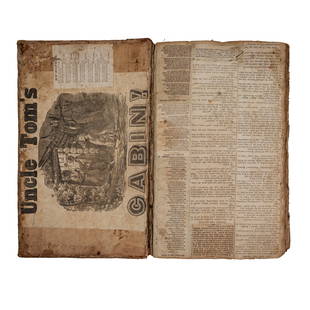
[Roman History] Livius - Sigonio, 1566, 2 works
Similar Sale History
View More Items in Books, Magazines & Papers
![1678 LIVY"s ROMAN HISTORY HISTORIARUM AB URBE CONDITA antique VELLUM ELZEVIR 3 v: [1678 ELZEVIER] Titus LIVIUS HISTORIARUM AB URBE CONDITA Historiarum quod extat cum perpetuis Car. Sigonii & J. Fr. Gronovii notis. Jac. Gronovii probavit, suasque & aliorum notas adjecit. Amstelodami](https://p1.liveauctioneers.com/5584/255010/132642468_1_x.jpg?height=310&quality=70&version=1658264891)
Related Books, Magazines & Papers
More Items in Books, Magazines & Papers
View MoreRecommended Collectibles
View More






![[Roman History] Livius - Sigonio, 1566, 2 works](https://p1.liveauctioneers.com/2198/121335/65753884_1_x.jpg?quality=1&version=1541103226&width=486)
![[Roman History] Livius - Sigonio, 1566, 2 works](https://p1.liveauctioneers.com/2198/121335/65753884_1_x.jpg?quality=80&version=1541103226)
Item Details
Description
SECOND ENLARGED ALDINE EDITION OF LIVY'S HISTORIES OF ROME
Livius, Titus. T. Liuii Patauini, Historiarum ab vrbe condita, libri, qui extant, XXXV cum vniuersae historiae epitomis. Adiunctis scholijs Caroli Sigonii, quibus ijdem libri, atque epitomae partim emendantur, partim etiam explanantur. Secunda editio.. Venetiis : apud Paulum Manutium, Aldi f., 1566 [Venice: Paolo Manuzio, 1566].
[bound with:]
Sigonio, Carlo. Caroli Sigonii Scholia, quibus T. Liuii Patauini historiae, et earum epitomae partim emendantur, partim etiam explanantur. Eiusdem in eosdem libros Chronologia, ipsorummet auctorum verbis confirmata. Venetiis: apud Paulum Manutium, Aldi f., 1566 [Venice: Paolo Manuzio, 1566].
2 parts in a volume in-folio, 18th century calf, red label and gilt-lettered title at spine gilt decorations at spine, red edges; [52], 399, [1], 107, [1] leaves (prelim. leaf 6 and the last leaf blank).
Second enlarged aldine edition of Livy's Historiae ad Urbe condita («Histories from the foundation of Rome»), a monumental history of Rome and the Roman people, covering the period from the earliest legends of Rome well before the traditional foundation in 753 BC through the reign of Augustus in Livy's own time.
In his Histories, Livy explains the complete history of the city of Rome, from its foundation to the death of Augustus (14 AD). Because he was writing under the emperor Augustus, Livy's history emphasizes the great triumphs of Rome. He wrote his history with embellished accounts of Roman heroism in order to promote the new type of government implemented by Augustus when he became emperor. In Livy's preface to his history, he said that he did not care whether his personal fame remained in darkness, as long as his work helped to «preserve the memory of the deeds of the world's preeminent nation». Because Livy was writing about events that had occurred hundreds of years beforehand, the value of his history was questionable, although many Romans came to believe what he wrote to be the true history of Rome's foundation.
Titus Livius (59 BC-AD 17), also know in English as Livy, was a Roman historian, who went from Padua, his home city, to Rome in the 30s BC, and it is likely that he spent a large amount of time in the city after this, although it may not have been his primary home. During his time in Rome, he was never a senator nor held any other governmental position. His elementary mistakes in military matters show that he was never a soldier. However, he was educated in philosophy and rhetoric. It seems that Livy had the financial resources and means to live an independent life. He devoted a large part of his life to his writings, which he was able to do because of his financial freedom. He was familiar with the emperor Augustus, formerly Octavian, and the imperial family. Considering Augustus came to be known as the greatest Roman emperor in the eyes of the Romans, being a historian under Augustus was very beneficial to Livy's career even after his death.
Livy's only surviving work is this History of Rome, which was his career from an age in middle life, until he left Rome for Padua in old age, probably after the death of Augustus in the reign of Tiberius. When he began this work he was already past his youth; presumably, events in his life prior to that time had led to his intense activity as a historian. Seneca the Younger gives brief mention that he was also known as an orator and philosopher and had written some treatises in those fields from a historical point of view.
Livy wrote during the reign of Augustus, who came to power after a civil war with B-Continentals and consuls claiming to be defending the Roman Republic, such as Pompey. Patavium had been pro-Pompey. To clarify his status, the victor of the civil war, Octavian Caesar, had wanted to take the title Romulus (the first king of Rome) but in the end accepted the senate proposal of Augustus. He did not abolish the republic de facto but adapted its institutions into the empire.
During the Middle Ages interest in Livy declined. The Renaissance was a time of intense revival; the population discovered that Livy was being lost and large amounts of money changed hands in the rush to collect Livy manuscripts. The poet Beccadelli sold a country home for the money to purchase one manuscript copied by Poggio. Petrarch and Pope Nicholas V launched a search for the now missing books. Laurentius Valla published an emended text initiating the field of Livy scholarship. Dante speaks highly of him in his poetry, and Francis I of France commissioned extensive artwork treating Livian themes; Niccolò Machiavelli's work on republics, the Discourses on Livy is presented as a commentary on the History of Rome.
Carlo Sigonio (1524-1584) was an Italian humanist, who attended the philosophical schools of Bologna and Pavia, and in 1545 was elected professor of Greek in Modena, his native place. In 1552 he was appointed to a professorship at Venice, which he exchanged for the chair of eloquence at Padua in 1560. He collaborated as editor with Paulus Manutius and his Aldine Press, also publishing some orginal works about Roman antiquities, as Fasti Consulares(1556, see lot 140).
References: CNCE, 28254. OCLC, 27036593. Renouard 202.19. Adams L-1344. Schweiger I, 531.
Livius, Titus. T. Liuii Patauini, Historiarum ab vrbe condita, libri, qui extant, XXXV cum vniuersae historiae epitomis. Adiunctis scholijs Caroli Sigonii, quibus ijdem libri, atque epitomae partim emendantur, partim etiam explanantur. Secunda editio.. Venetiis : apud Paulum Manutium, Aldi f., 1566 [Venice: Paolo Manuzio, 1566].
[bound with:]
Sigonio, Carlo. Caroli Sigonii Scholia, quibus T. Liuii Patauini historiae, et earum epitomae partim emendantur, partim etiam explanantur. Eiusdem in eosdem libros Chronologia, ipsorummet auctorum verbis confirmata. Venetiis: apud Paulum Manutium, Aldi f., 1566 [Venice: Paolo Manuzio, 1566].
2 parts in a volume in-folio, 18th century calf, red label and gilt-lettered title at spine gilt decorations at spine, red edges; [52], 399, [1], 107, [1] leaves (prelim. leaf 6 and the last leaf blank).
Second enlarged aldine edition of Livy's Historiae ad Urbe condita («Histories from the foundation of Rome»), a monumental history of Rome and the Roman people, covering the period from the earliest legends of Rome well before the traditional foundation in 753 BC through the reign of Augustus in Livy's own time.
In his Histories, Livy explains the complete history of the city of Rome, from its foundation to the death of Augustus (14 AD). Because he was writing under the emperor Augustus, Livy's history emphasizes the great triumphs of Rome. He wrote his history with embellished accounts of Roman heroism in order to promote the new type of government implemented by Augustus when he became emperor. In Livy's preface to his history, he said that he did not care whether his personal fame remained in darkness, as long as his work helped to «preserve the memory of the deeds of the world's preeminent nation». Because Livy was writing about events that had occurred hundreds of years beforehand, the value of his history was questionable, although many Romans came to believe what he wrote to be the true history of Rome's foundation.
Titus Livius (59 BC-AD 17), also know in English as Livy, was a Roman historian, who went from Padua, his home city, to Rome in the 30s BC, and it is likely that he spent a large amount of time in the city after this, although it may not have been his primary home. During his time in Rome, he was never a senator nor held any other governmental position. His elementary mistakes in military matters show that he was never a soldier. However, he was educated in philosophy and rhetoric. It seems that Livy had the financial resources and means to live an independent life. He devoted a large part of his life to his writings, which he was able to do because of his financial freedom. He was familiar with the emperor Augustus, formerly Octavian, and the imperial family. Considering Augustus came to be known as the greatest Roman emperor in the eyes of the Romans, being a historian under Augustus was very beneficial to Livy's career even after his death.
Livy's only surviving work is this History of Rome, which was his career from an age in middle life, until he left Rome for Padua in old age, probably after the death of Augustus in the reign of Tiberius. When he began this work he was already past his youth; presumably, events in his life prior to that time had led to his intense activity as a historian. Seneca the Younger gives brief mention that he was also known as an orator and philosopher and had written some treatises in those fields from a historical point of view.
Livy wrote during the reign of Augustus, who came to power after a civil war with B-Continentals and consuls claiming to be defending the Roman Republic, such as Pompey. Patavium had been pro-Pompey. To clarify his status, the victor of the civil war, Octavian Caesar, had wanted to take the title Romulus (the first king of Rome) but in the end accepted the senate proposal of Augustus. He did not abolish the republic de facto but adapted its institutions into the empire.
During the Middle Ages interest in Livy declined. The Renaissance was a time of intense revival; the population discovered that Livy was being lost and large amounts of money changed hands in the rush to collect Livy manuscripts. The poet Beccadelli sold a country home for the money to purchase one manuscript copied by Poggio. Petrarch and Pope Nicholas V launched a search for the now missing books. Laurentius Valla published an emended text initiating the field of Livy scholarship. Dante speaks highly of him in his poetry, and Francis I of France commissioned extensive artwork treating Livian themes; Niccolò Machiavelli's work on republics, the Discourses on Livy is presented as a commentary on the History of Rome.
Carlo Sigonio (1524-1584) was an Italian humanist, who attended the philosophical schools of Bologna and Pavia, and in 1545 was elected professor of Greek in Modena, his native place. In 1552 he was appointed to a professorship at Venice, which he exchanged for the chair of eloquence at Padua in 1560. He collaborated as editor with Paulus Manutius and his Aldine Press, also publishing some orginal works about Roman antiquities, as Fasti Consulares(1556, see lot 140).
References: CNCE, 28254. OCLC, 27036593. Renouard 202.19. Adams L-1344. Schweiger I, 531.
Condition
A waterstain's halo, affecting some leaves. Good copy.
Buyer's Premium
- 25% up to €10,000.00
- 22% up to €100,000.00
- 19% above €100,000.00
[Roman History] Livius - Sigonio, 1566, 2 works
Estimate €1,200 - €1,500
1 bidder is watching this item.
Shipping & Pickup Options
Item located in Verona, itSee Policy for Shipping
Payment

Related Searches
TOP















































































![George Washington Signed Discharge: Partly printed discharge document signed by George Washington, as Commander in Chief of the Armies of the United States. Newburgh, [New York], 4 January 1783. 1 page, ## x ## in. Undersigned by Washin](https://p1.liveauctioneers.com/7226/322253/173251475_1_x.jpg?height=310&quality=70&version=1710004847)


